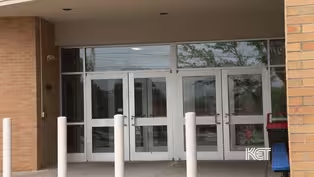
Long-Term Care Providers React to New Federal Staffing Regulations for Nursing Homes
Clip: Season 2 Episode 244 | 3m 44sVideo has Closed Captions
Long-term care providers react to new federal staffing regulations for nursing homes.
Long-term care providers react to new federal staffing regulations for nursing homes. The new rules require registered nurses to be on site 24-7 and set new minimum staffing standards for nurses.
Problems playing video? | Closed Captioning Feedback
Problems playing video? | Closed Captioning Feedback
Kentucky Edition is a local public television program presented by KET

Long-Term Care Providers React to New Federal Staffing Regulations for Nursing Homes
Clip: Season 2 Episode 244 | 3m 44sVideo has Closed Captions
Long-term care providers react to new federal staffing regulations for nursing homes. The new rules require registered nurses to be on site 24-7 and set new minimum staffing standards for nurses.
Problems playing video? | Closed Captioning Feedback
How to Watch Kentucky Edition
Kentucky Edition is available to stream on pbs.org and the free PBS App, available on iPhone, Apple TV, Android TV, Android smartphones, Amazon Fire TV, Amazon Fire Tablet, Roku, Samsung Smart TV, and Vizio.
Providing Support for PBS.org
Learn Moreabout PBS online sponsorshipThe Biden administration recently announced new regulations for long term care providers like nursing homes.
The new rules require registered nurses to be onsite 24 seven and set new minimum staffing standards for nurses.
The announcement has been polarizing, with some patient centered groups worried the new rules don't go far enough.
Meanwhile, some long term care providers say they're worried the regulations could put certain facilities out of business.
Outside of a nuclear power plant.
The long term care industry is about the heaviest regulated industry there is.
And we certainly understand the need for regulations because it's our job to keep our residents safe and provide a holistic approach to their care while they're under our care at our facility.
The new staffing mandate has been something that has been in discussion for quite some time for the state of Kentucky.
It is something that the industry as a whole is a little more shivering about because it does make us nervous.
There's no funding for this.
I think HHS agreed to put $65 million nationally into recruiting individuals into health care workforce, but that's really a drop in the bucket of what we need.
The individuals that work in these facilities can't just be cleaned out every day.
You know, there's education certifications that need to happen.
And and unfortunately, we just they're not in the pipeline.
I don't know that this is a problem that we can just throw money at that, frankly, the people aren't there, so the workforce isn't there.
Even if we had, you know, an exhausted amounts of money, there's just no one to pick up these roles.
We're the lowest reimbursed entity when you look at acute care and obviously it requires a special person to work with our population.
Our challenge with this mandate will be recruitment and retention of our ends, specifically because we're up against the hospitals who have all of the new and shiny.
They are aware new nurses a lot of times tend to want to be and their they're paying compensation.
And even the benefit packages that these large hospitals can provide are unique and are a challenge for facilities like ours, particularly like us as a nonprofit stand alone facility.
There's a small pool of people.
How do we get that pool of people interested to work in an environment like ours?
There is a real stigma attached to long term care that's kind of unnecessary.
You have billboards from attorneys saying, Did your grandmother fall in the nursing home?
You know, call us, you know, there.
You're seeing that subliminally.
Subliminally.
You don't even realize.
But, you know, you're already attaching it.
Now you're attaching a stigma to that, to the skilled nursing home.
Until we until we revisit and create a new image to leave that stigma of long term care, it's going to continue to be a challenge.
I think what's going to happen is we're going to put this thing in play and then I think we're going to see that we're going to have to back up and punt again, because I don't think that it's realistic that a lot of these facilities are going to be able to survive, even if there are exemptions.
The Kentucky Center for Assisted Living is supporting the protecting rural Seniors Access to Care Act, which would prevent the minimum staffing regulations for nursing facilities.
Candidates for Congress Discuss Their Views on Abortion and the Israel-Hamas War
Video has Closed Captions
Clip: S2 Ep244 | 3m 38s | Candidates for Congress discuss their views on abortion and the Israel-Hamas war. (3m 38s)
Eastern Kentucky's State Senators Tour Region to Promote New Infrastructure Funding
Video has Closed Captions
Clip: S2 Ep244 | 1m 31s | Eastern Kentucky's state senators tour region to promote new infrastructure funding. (1m 31s)
Headlines Around Kentucky (5/7/2024)
Video has Closed Captions
Clip: S2 Ep244 | 3m 7s | Headlines Around Kentucky (5/7/2024). (3m 7s)
Health Department Reports Third Confirmed Case of Whooping Cough at Lexington Schools
Video has Closed Captions
Clip: S2 Ep244 | 3m 16s | Health department reports third confirmed case of whooping cough at Lexington schools. (3m 16s)
University of Kentucky Senate Casts Vote of ‘No Confidence’ in President Eli Capilouto
Video has Closed Captions
Clip: S2 Ep244 | 2m 51s | University of Kentucky Senate casts vote of ‘no confidence’ in President Eli Capilouto. (2m 51s)
Providing Support for PBS.org
Learn Moreabout PBS online sponsorship
- News and Public Affairs

Top journalists deliver compelling original analysis of the hour's headlines.

- News and Public Affairs

FRONTLINE is investigative journalism that questions, explains and changes our world.












Support for PBS provided by:
Kentucky Edition is a local public television program presented by KET




